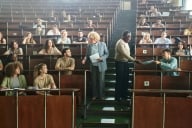You have /5 articles left.
Sign up for a free account or log in.
When the play Corpus Christi was revived in New York City in 2008, a review in The New York Times talked about how in the decade since the Terrence McNally play was first produced, the culture wars had subsided. "I didn’t even walk through a metal detector. Times have certainly changed," he wrote.
Of course the revival was in New York City, not in Stephenville, Texas, home of Tarleton State University, where the culture wars are very much alive, at least for this work, in which a Jesus-like character is portrayed as gay, and says that the Bible should not be used to oppose gay marriage or love. A student production of the play was to have taken place at Tarleton State Saturday but it was canceled by the university, citing security concerns.
The university issued a statement Friday night that said: "The four student-directed plays, including Corpus Christi, scheduled to be performed at Tarleton State University on Saturday, March 27, 2010, have been canceled this evening by the professor. The professor cited safety and security concerns for the students as well as the need to maintain an orderly academic environment as reasons for canceling the plays. The performance of these four class plays will not be rescheduled." A note from the university's press office said that no questions would be answered.
A drama professor at the university, Mark Holtorf, told The Fort Worth Star-Telegram: "We received so many threatening calls and e-mails today across campus, the numbers were staggering. One administrator received in excess of 800 e-mails.... Our department received calls of a threatening nature. I could not guarantee the safety of my students. The administration was truly behind the academic exercise, but I could not justify the safety risk."
A gay student selected the play and defended its message -- in which parts of the Jesus story are shown in modern-day Texas -- as showing universal ideas. But many local residents objected, and were joined by politicians. Originally, the president of Tarleton State, F. Dominic Dottavio, issued a strong defense of free expression, saying that the university "is committed to protecting and preserving the freedoms of thought, speech and expression."
But as the controversy grew, the university first announced that the play would be shown only early Saturday morning, with reporters and others not affiliated with the university barred from attending. Further, the president issued a new statement (prior to the cancellation) in which he stressed that the university had no legal option but to allow the play. "As a public university we are legally bound to allow the student production to go forward. We have had many conversations with the Office of General Counsel for the Texas A&M University System and they have made it clear to us that this is an unambiguous freedom of speech (First Amendment) issue," he wrote.
He also denounced the play. "As you might imagine, many people have shared with me quotes, excerpts and even video clips of the play. My personal reaction is that I see no artistic or redeeming quality in the work. I believe, as many have opined, that it is offensive, crude, and irreverent," he wrote. "It is my sense that there are significant numbers of faculty, staff and students at Tarleton who share my views of the play. "
Many faculty members did not respond to requests to discuss the situation. One forwarded an e-mail from the provost telling professors not to talk to reporters, explaining that to assure that "media do not get conflicting reports of the university's position," all inquiries were to be referred to the official spokeswoman.
Before the play was called off, one faculty member -- Moumin Quazi, an assistant professor of English -- wrote an essay in the student newspaper praising the university for sticking by the controversial work.
"I am grateful to work at an institution that is about education as opposed to indoctrination," he wrote. "I am grateful to have a president here at Tarleton who stands firm for academic freedom in the marketplace of ideas. Especially as a Salman Rushdie scholar and postcolonial critic, I cheer and cherish academic freedom. And, thankfully, at Tarleton State University, I am not afraid of recrimination for teaching controversial, yet thought-provoking works, regardless of which group or religion may protest."
On a Facebook group of those who called for the production to be called off, many comments denounced the university for having even considered allowing the play. One comment said: "This play MOCKS what most of us believe in. Tarleton is supposed to be a close tight family and why are they upsetting family members. Do they have any idea how this is affecting the university?"








